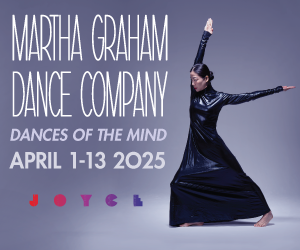AUDIENCE REVIEW: Trisha Brown Dance Company

Company:
Trisha Brown Dance Company
Performance Date:
07/13/2012
Company / Show / Event
Trisha Brown Dance Company
Performance Date
07/13/2012
Venue / Location
Park Avenue Armory
A bit about you:
(your occupation, the last time you moved, your website, etc.)
Please visit me at erinbomboy.blogspot.com
Freeform Review:
Trisha Brown Dance Company: A Cerebral Enigma
Trisha Brown stands as one on the pillars of the post modern dance movement. At seventy-six years old, she has created over forty works, which radically changed the face of 20th century dance.
Her recent show at the Park Avenue Armory, a cavernous space reminiscent of a chicly appointed airplane hangar, restages her 1991 piece, Astral Converted with music by John Cage. Robert Rauschenberg’s visual presentation consists of eight towers ranging in height from basketball player to toddler sized; they are loosely grouped towards the right and left margins of the dance area. The towers contain artful arrays of car batteries, headlights, and stereo systems. Dancers occasionally create new, indefinite configurations with the towers, drifting them closer to the center.
%20Stephanie%20Berger%201(1).jpg) |
| Astral Converted ( studio shot); Photo © Stephanie Berger |
A hush descends over the audience as nine dancers, five women and four men, enter. They wear shiny mother-of-pearl unitards; the only condescension to gender being a chiffon triangle stitched onto to the females’ inner legs giving the perception of a skirt. With faces composed into blank masks, the dancers resemble bored aliens.
Brown’s choreography is a thick, complicated stew of quick, jumping peaks; impressive rolls and slides across the floor; clever, sometimes stunning partnering; and seamless, pedestrian transitions that belie the physical intensity of the previous actions. The dancers, all wonderful, all indistinguishable, form ever-shifting amalgamations of one, two, three, four and more members before dissolving into new arrangements. Some hang out on the sidelines, eying their fellow dancers before joining in, as others melt into the periphery.
Brown’s organizational motives are obscure. Groups endlessly form, evaporate, and reassemble with no discernible compulsion or loyalty. In one of the few memorable vignettes, two dancers appear with janitorial brooms and sweep obsessively as the action continues to swirl around them. After a slick quartet where the cleaners are literally swept off their feet, the brooms disappear, never to return. There will be no build or climax; you will know to applaud when the lights abruptly go out. It seems this is not a community of living, feeling humans, these are robots dispassionately performing the movement tasks that Brown, their puppet-master, directs using her own opaque reasoning.
Astral Converted feels like a rather long lecture on a complicated subject like physics or calculus. It’s genius; you intellectually relish in Brown’s dense, complex choreography that refuses to pander to cheap thrills. But your heart does not beat fast and your breath does not catch in your throat. It’s just too cryptic to care about.












